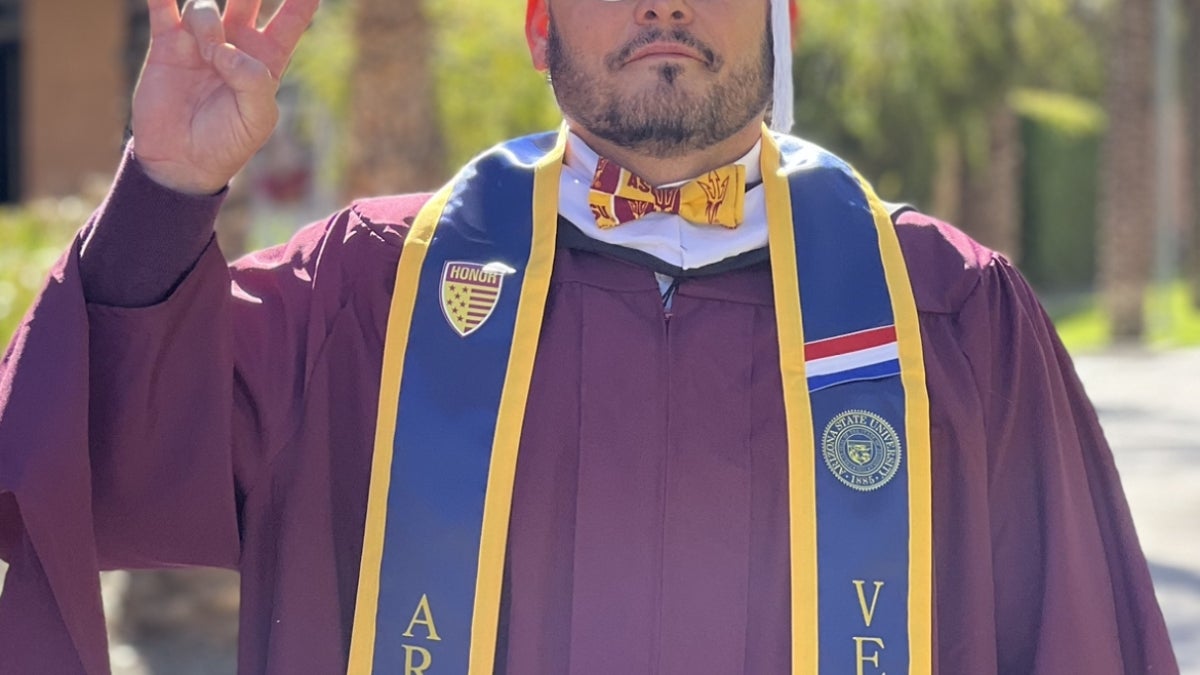Editor’s note: This story is part of a series of profiles of notable fall 2022 graduates.
Shawn Banzhaf, author of “The Five Ls: A Practical Guide for Helping Loved Ones Heal After Trauma,” is graduating with his master’s degree in sociology from the T. Denny Sanford School of Social and Family Dynamics this winter.
Banzhaf, who is from Chadron, Nebraska, is best known for the bright, colorful glasses he wears and the vibrant energy he brings to the Pat Tillman Veterans Center. As an associate director of student success (who was recently named the center's executive director), Banzhaf draws on his personal experiences to help student veterans transition to university life, a process he went through himself.
He joined ASU after a 21-year career in the United States Army National Guard, where he served countless combat missions in Iraq and earned the Bronze Star and Combat Action Badge.
In a podcast episode with the Sanford School, Banzhaf described the struggles involved in adjusting to college after military life. Those in the military learn to value teamwork and follow orders above all else, so it takes time for student veterans to adapt to the freedom and independence required to succeed in college, he said. It's not easy when a teacher allows autonomy over an assignment rather than defining a specific set of objectives.
Banzhaf has proven, however, that it is possible to overcome these challenges and succeed in school. Not only has he completed a master's degree, but he is also set to continue serving at the Pat Tillman Veterans Center in a higher capacity, which he considers his "dream job."
We asked Banzhaf about his motivations for pursuing a master's degree in sociology and what he took away from his time as a student.
Question: What was your “aha” moment, when you realized you wanted to study the field you majored in?
Answer: I knew that getting a master's in sociology would be the right fit for me when I began to problem solve for what student veterans needed at ASU. Having a degree like this allows me to ask the right questions and gain the right data to make a positive impact on our military affiliated population.
Q: What’s something you learned while at ASU — in the classroom or otherwise — that surprised you or changed your perspective?
A: How wonderfully supportive everyone is! I came from a small town in Nebraska where everyone helped one another and wasn't sure how I would adjust to the enormity of ASU. What I found was that people here care for you and want to see you achieve great things and I am thankful for that.
Q: Why did you choose ASU?
A: Partly because I work here but also because I have been a witness to how ASU helps to improve our world and that drove me to choose it!
Q: Which professor taught you the most important lesson while at ASU?
A: Gosh, that's a loaded question! All of my professors taught me the most important lesson and that is work hard and keep an open mind along the journey.
Q: What’s the best piece of advice you’d give to those still in school?
A: See it through. Don't give up, you are worth it!
Q: What are your plans after graduation?
A: Plan is already set! I just accepted an offer to be the next executive director for the Pat Tillman Veterans Center here at ASU! Dream job!
Q: If someone gave you $40 million to solve one problem on our planet, what would you tackle?
A: I would use that money to solve the problem of systemic racism to help create a better more equitable society.
More Arts, humanities and education

Award-winning playwright shares her scriptwriting process with ASU students
Actions speak louder than words. That’s why award-winning playwright Y York is workshopping her latest play, "Becoming…

Exceeding great expectations in downtown Mesa
Anyone visiting downtown Mesa over the past couple of years has a lot to rave about: The bevy of restaurants, unique local shops…

Upcoming exhibition brings experimental art and more to the West Valley campus
Ask Tra Bouscaren how he got into art and his answer is simple.“Art saved my life when I was 19,” he says. “I was in a…


